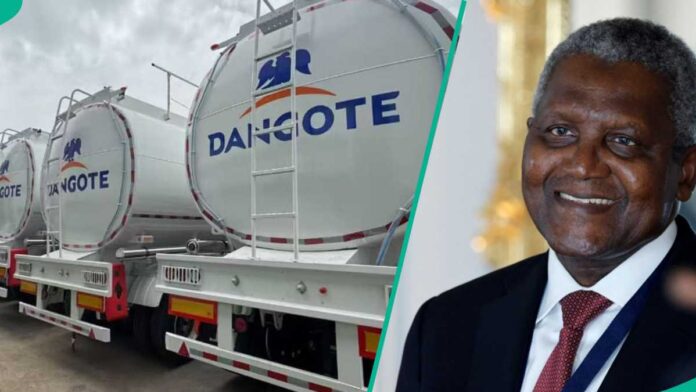By Dickson Pat
Petroleum Products Retail Outlets Owners Association of Nigeria ,PETROAN, has raised concerns on Dangote Refinery’s forward integration strategy on fuel distribution. The association cautioned that it could lead to a monopoly in disguise.
The National President of PETROAN, Dr Billy Gillis-Harry on Monday said it could pose a significant job loss threat to Nigeria while many fuel stations would be forcefully shutdown.
Dangote Petroleum Refinery on Sunday announced the commencement of a significant national initiative designed to transform Nigeria’s fuel distribution landscape.
The refinery said effective from August 15, it would begin distribution of fuel and diesel to marketers, dealers, manufacturers, telecommunication firms, aviation, and other large users nationwide, “with free logistics” to boost distribution network.
To ensure smooth take-off of this scheme, Dangote Refinery had invested in the procurement of 4,000 brand-new Compressed Natural Gas ,CNG-powered tankers.
The refinery is also investing in CNG stations, commonly referred to as daughter booster stations, supported by a fleet of over 100 CNG tankers across the country to ensure seamless product distribution and eliminate logistics costs.
Reacting to this, Gillis-Harry argued that with a production capacity of 650,000 barrels per day, Dangote Refinery should be competing with global refineries, not operating as a distributor in the downstream sector.
“This massive refinery, one of the largest in sub-Saharan Africa, is expected to satisfy domestic fuel demand and export surplus products.
“PETROAN has previously raised alarms about Dangote’s intentions to dominate the downstream sector, citing concerns that the company may leverage its market power to fix prices, limit competition, and exploit consumers, much like it has done in other sectors.
“PETROAN warns that Dangote’s tactics may include a pricing penetration strategy, where they reduce prices to capture market share, with the ultimate goal of forcing other filling station operators to quit the market.
“This could lead to a massive shutdown of filling stations across Nigeria, resulting in widespread job losses”, he said.
He said the introduction of 4,000 brand-new CNG-powered tankers by Dangote Refinery posed a significant threat to the livelihoods of thousands of truck drivers and owners.
He explained that while CNG trucks may offer a lower cost of transporting petroleum products, the shift could lead to widespread job losses in the industry.
Speaking on its impact on various stakeholders, he said the adoption of a forward integration strategy by Dangote Refinery would greatly affect Modular Refineries, because their operations and market share may be threatened by Dangote’s dominance.
He said it would affect the Truck Owners because job losses could occur due to its direct supply and CNG-powered tankers while Filling Station Operators may shut down forcefully due to Dangote’s pricing penetration strategy and dominance.
“It will affect local suppliers of petroleum products and telecom diesel suppliers because their businesses may be negatively impacted by Dangote’s direct supply to end-users.
“It is obvious that Dangote plans to gain full monopoly of the downstream sector, which would enable the company to exploit Nigeria’s petroleum consumers.
“This could lead to higher prices, reduced competition, and decreased economic efficiency”, he said.
He called on the Nigerian Midstream and Downstream Petroleum Regulatory Authority ,NMDPRA, and the Ministry of Petroleum to put in place price control mechanisms to prevent any form of monopoly and protect consumers.





